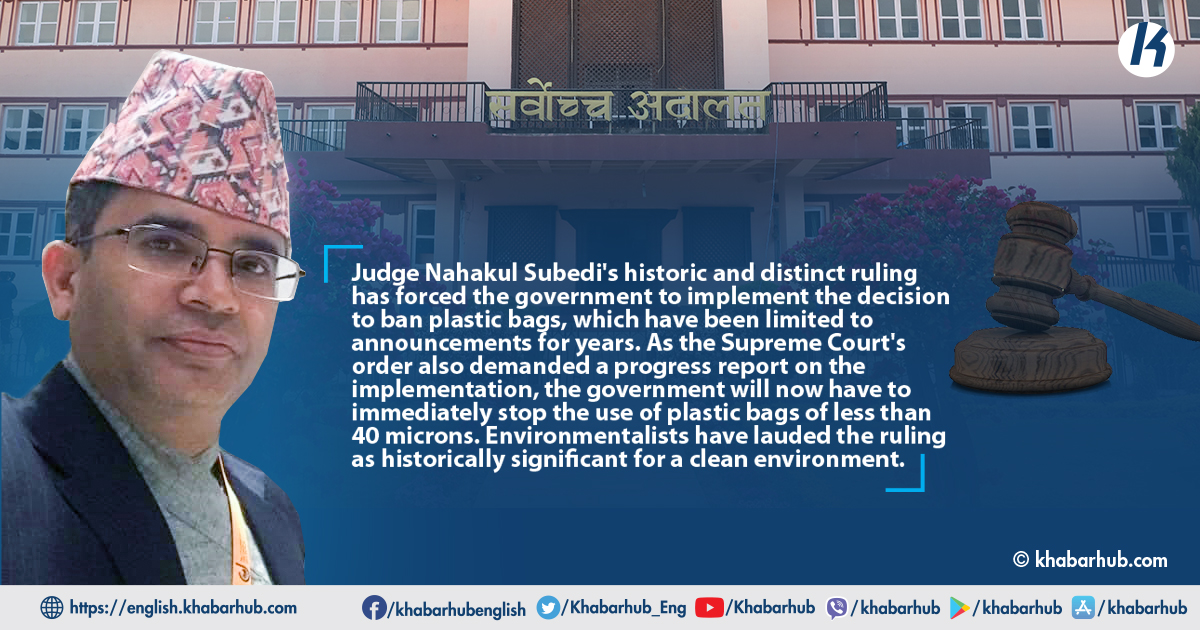KATHMANDU: The historic decision on banning the use of plastics (thinner than 40 microns) within 21 days by Supreme Court (SC) Justice Nahakul Subedi has been a vindication of the government efforts to end the menace of such bags and its environmental consequences.
The distinct decision by Justice Subedi has been aimed at resolving Nepal’s plastic woes when it comes to environmental governance, however, what the government lacks is intent, not laws.
A single bench of Justice Subedi issued an interim order to the government asking the latter to impose a complete ban on the use of plastic bags with less than 40-micron thickness in response to a writ petition filed by Advocate Padam Bahadur Shrestha.
In his writ petition, Advocate Shrestha had argued that the budget 2021/22 had included the provision contradictory to the precedent seeking the absolute restriction on the production, import, sales and distribution, and use of the plastic products consisting the plastics thinner than 40 microns.
Justice Subedi’s verdict also asked the defendant’s Office of the Prime Minister and Council of Ministers to submit its written reply within 15 days via the office of the Attorney General stating why the verdict sought by the petitioner should not be granted.
The SC has further stated that the authority concerned had additional 10 days for making arrangements such as consultation with stakeholders, policy formulation and implementation after the action plan is prepared.
The court’s decision to ban the use of plastic bags thinner than 40 microns is surely a significant one for the fight against plastic bags as raised by environmentalists in the country.
The SC has also stated that since the new fiscal budget had mentioned doing away with the use of plastic bags with less than 40-micron thickness from July 16, it has asked the government to enforce the ban effectively.
Now that the time has come for the authorities concerned to make people and stakeholders aware of their liabilities and responsibilities to deal with environmental pollution due to the use of such plastics.
Justice Subedi, in the verdict, has instructed the authority concerned to make an action plan of the work, duties and responsibilities within 10 days to implement the plan effectively.
The SC has further stated that the authority concerned had additional 10 days for making arrangements such as consultation with stakeholders, policy formulation and implementation after the action plan is prepared.
The verdict states: “From the 21st day after this order is received, the provision of point 160 of the budget statement of 2021/22 concerning the complete ban on the production, import and use of plastic bags (thinner than 40 microns) will be implemented across the country.”
A simple reason why plastic bans do not work is that they are not backed by regulatory resoluteness. Therefore, it is the responsibility of the regulatory bodies to enforce the decision of the SC rather than losing yet another battle against plastics.
Furthermore, the SC has also asked the Chief Secretary to set up a mechanism to monitor the implementation of the action plan and submit a report every two months.
The decision comes amid reports that several unregistered industries were producing substandard and low-quality plastics in the country with a significant quantity of such bags coming from across the border.
The Ministry of Environment had on April 2015 issued a directive to ban the production of plastic bags and other products less than 40 microns, and that the government, too, has published the information in the Gazette. However, the government had failed to implement its decision.
It should also be recalled that the government had issued the Plastic Waste Regulation and Control Guideline -2068 BS aimed at banning plastic wares. The government had also announced to ban plastic nags in the budget of the Fiscal Year 2073/74 BS.
Earlier, the government had even decided to ban plastic bags less than 30 microns in the Kathmandu Valley and surrounding areas from 2072 BS since plastics bags would have adverse effects on health, the environment, and urban beauty.
During the monitoring of plastic bags, the Department of Environment had also imposed fines of Rs. 5,000.
If the SC’s orders are implemented, the amount of non-biodegradable waste would be reduced by a quarter, and that rivers such as Bagmati, Bishnumati, Dhobikhola, and Manohara could have become plastic-free.
A simple reason why plastic bans do not work is that they are not backed by regulatory resoluteness. Therefore, it is the responsibility of the regulatory bodies to enforce the decision of the SC rather than losing yet another battle against plastics.









Comment